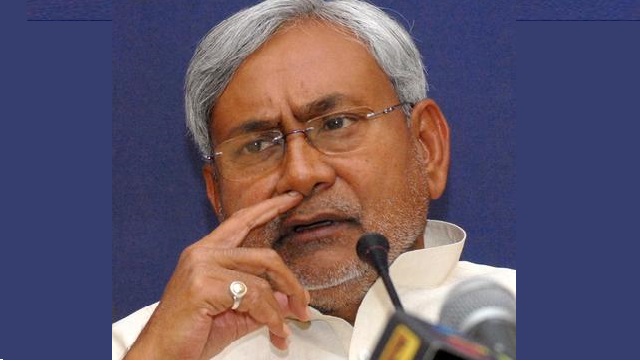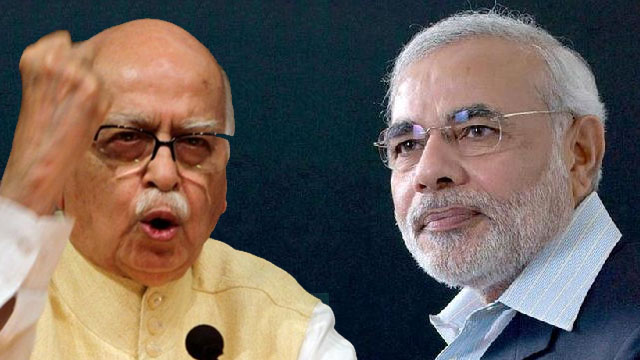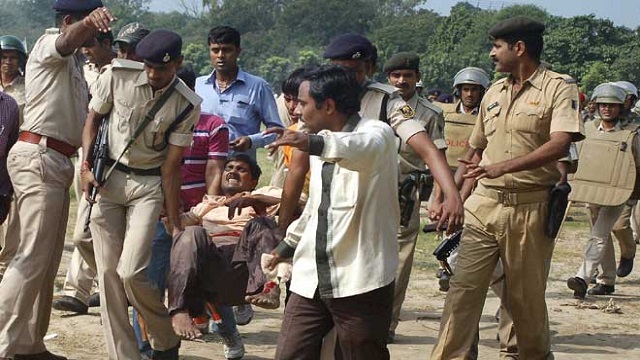In reply to NaMo’s ‘˜tallest statue in the world’ he laid the foundation of ‘˜largest temple in the world’ in his state. So, it will be quite interesting to see what pops out of his purse in his pursuit to counter NaMo ‘“ maybe joining Congress’¦
Since the chants of Narendra Modi went up, Bihar Chief Minister Nitish Kumar has been trying all that he could to consolidate his position above NaMo.
In order to re-affirm his ‘Vikas Purush’ image, Kumar again spoke about his commitment of toilets-for-all saying that open defecation is an affront to human dignity and his government will ensure that this problem is addressed in an urgent manner.
We have already seen NaMo raising the slogan of “Toilets before Temples” which was just a new wine in old bottle as Rural Development Minister Jairam Ramesh practically owned this idea. But Nitish seems to be moving the legacy of “owning-what-is-good-but-not-yours” forward.
When he had ‘owned’ this issue, he had said that that those lacking a toilet in their homes will not be allowed to contest panchayat or urban local body elections in Bihar.
In his latest blog (yes he had started writing blogs just like NaMo and senior BJP leader LK Advani) he wrote, “Open defecation is an affront to human dignity, a curse to humanity. As someone bestowed with people’s affection to serve them, I feel it is my utmost duty to ensure them a life of dignity. Access to toilets are at the core of this.”
The blog stated, “We are committed to bring the necessary amendments to the Bihar Panchayati Raj Act and other statutes governing the elections of urban bodies to raise public awareness about the benefits of toilets in houses.”
“The central government had aimed to construct 1.11 crore (over 11 million) toilets in the state, our records show that 2.19 crore (21.9 million) families do not have a toilet in their home,” it added.
Bihar, the second most populous state in the country, has an estimated population of 100 million people.
Recalling his government’s measure to construct toilets in every household of the state, Kumar said, “Inspired by Lohia’s (Ram Manohar Lohia) vision and my personal conviction, we had designed and launched the unique Lohia Swachhata Yojana in 2006 with an aim to ensure toilets-for-all.”
“I am proud to note that, other than Maharashtra, Bihar was the only state to have launched a unique scheme to address the problem of open defecation. The Lohia Swachhata Yojana was designed to achieve the objective of providing sustainable toilets to all households by 2015,” he said.
“I am of the firm belief that ensuring a dignified life – and providing basic facilities to its people – is a fundamental duty of the state. If my government can ensure this existential decorum for the people of Bihar, this will be one of my biggest achievements,” said the Bihar chief minister.
“This has been an enduring dream, and close to my heart – and seeing it happening in my lifetime shall give me immense solace,” added Nitish Kumar.
Kumar said he had announced this year that the panchayats achieving 100 percent target of constructing toilets would be given the Nirmal Gram Panchayat prize of Rs.5 lakh each. The Nirmal Prakhand award would carry Rs.25 lakh in prize for blocks for conducting a cleanliness drive.
“My effort is aimed at addressing a fundamental woe of human civilization, a cause for which Mahatma Gandhi spent considerable efforts. My head sinks with shame when I am told that over 600 million people in India or 53 percent of Indian households today have to suffer the humiliation of defecating in the open,” Nitish Kumar said.
“It is sad, as WHO has noted, that every day, nearly two billion tons of human faeces, with a dizzying number of potential viruses, bacteria and worm eggs, are lying around our planet ready to be trodden on, touched or ingested in water and food,” he added.
He pointed that the consequences are not difficult to calculate: Diarrhoea, caused by contaminated food, water and environment, is still the second deadliest killer of children in the world, killing 1,600 children every day.
Kumar said that the attention and funding given to sanitation and diarrhoea – which is easily preventable with adequate sanitation, safe water and good hygiene – have for decades been dwarfed by that given to other causes and challenges.
When the Millennium Development Goals – a set of targets to reduce poverty and better maternal health and education amongst other things – were signed in 2000, sanitation wasn’t even mentioned, he added.
Though Nitish efforts should only be praised, we are also interested in what comes next. In reply to NaMo’s ‘tallest statue in the world’ he laid the foundation of ‘largest temple in the world’ in his state. So, it will be quite interesting to see what pops out of his purse in his pursuit to counter NaMo – maybe joining Congress…
-with inputs from IANS





